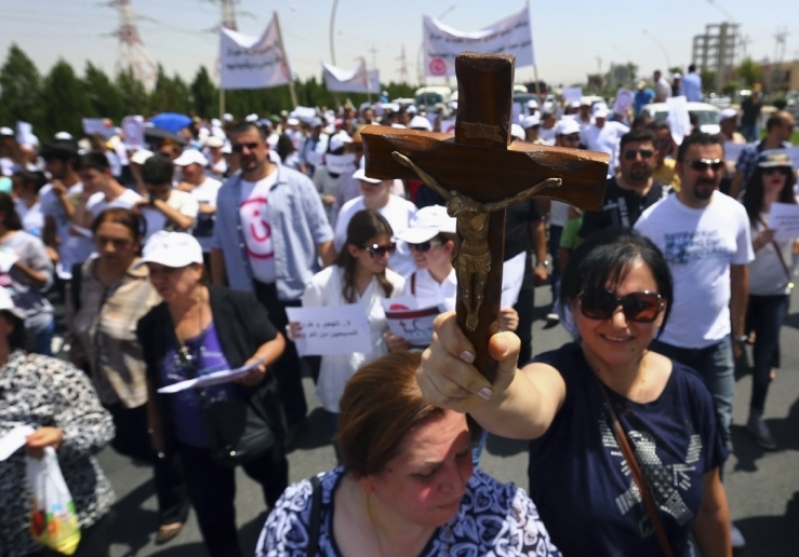
The terror group known as ISIS has directed its brutal forms of persecution against Christians and other minority groups in Syria and Iraq. Despite the risks, Christian communities in Iraq have teamed up to heal the country's wounds.
According to Michael Nazir-Ali of the Spectator, Iraqi Christians have faced assassinations, ransom kidnappings, expulsions and illegal occupation of properties throughout the country. The former Bishop of Rochester noted that such events have been taking place long before the rise of ISIS.
"The refugees are at pains to point out that the story of their woes precedes, by many years, the evil advent of ISIS," Ali wrote. "Since 2003, Islamic extremists have been blowing up churches, kidnapping clerics, looting shops and attacking Christian, Yazidi and Shabak homes more or less with impunity."
Ali reported that many refugees are living "on the very edge" of survival, facing unemployment, a lack of educational facilities, camp overcrowding and shortages of electricity and water. However, he noted that the refugees had "such a high morale" that he rarely found anywhere else.
"In many cases, this is explicitly linked to people's faith," Ali wrote. "Again and again, we heard that their faith was all they had left but that it was vital as they sought to resurface from the vicissitudes that have overtaken them with 'heads bloodied but unbowed.' For them, the question is not why evil exists, but how they have been saved from it."
According to Ali, some of the refugees wanted to leave Iraq immediately because of betrayal by "their neighbors and colleagues who have compromised with ISIS or capitulated completely." However, he acknowledged that many of them wanted to return to their homelands "under international protection."
"It certainly seems possible to put together a force that is not Western led, rather like the AU force in Somalia, but which has the support of the international community," Ali wrote. "Such a force would give confidence to the refugees and would provide an umbrella for, say, five years, while relationships are rebuilt."
Ali added that some of the refugees wished to stay in northern Iraq, where the Kurdistan Regional Government retains control. The Kurdish leadership has consistently stated that its government was not "Islamic" and everyone could practice their own faith; ordinary people have reinforced that notion to Ali.
"In many places, certainly, the Christian presence is public and high profile," Ali wrote of Kurdistan. "Yazidi temples also remain open and accessible. A Kurdistan that was genuinely characterized by freedom of belief would be a beacon of light in the darkness now drawing over not only Iraq but the whole region."
Ali observed that the churches seemed to have worked together very well. In Iraq, the Christian community breaks down into Chaldean, Syrian Catholic, and Syrian Orthodox and Assyrian churches.
"The camps, run by the churches, are well organized and clean," Ali wrote. "There are clear rules about what is socially unacceptable and the pastors of the different churches seem to have important roles in organizing and directing the life of the camps. Every camp has facilities for worship, education and medical care, showing clearly Christianity's abiding concern for these areas of human life and of society."
Ali noted that the camps were also open to other minority groups on an equal basis, including Yazidis, Shabak and Kakoyeiah people.
"Our religion hasn't got the structures to help us in this situation," a Yazidi leader in the camp said to Ali. "The churches have and we are grateful for all their help."
According to Ali, there has been debate by Christians living in the region whether or not to form militias to take on ISIS and other extremist forces.
"Some clearly have taken this option in both Iraq and Syria," Ali wrote. "The view of the leadership seems to be that they should instead join the army or the Kurdish Pesmerga, who have been effective against ISIS, even if limited by their lack of heavy armament and logistical support. There appears to be strong moral support for those desiring to protect the weak, the elderly and the children, as well as the historic properties of their community."
Ali warned that if the West decides to help out the affected communities, it "must respect their identity and integrity as indigenous Iraqi communities, some of which predate the arrival of Islam."
"Even unintentional westernization should be guarded against as it will alienate these communities from their context," Ali wrote.
Ali ended his article by thanking the charity Aid to the Church in Need and Archbishop Bashar Warda of the Chaldean Catholic Church for giving him "an opportunity to see such a living testimony of faith and hope in the most testing of circumstances."







